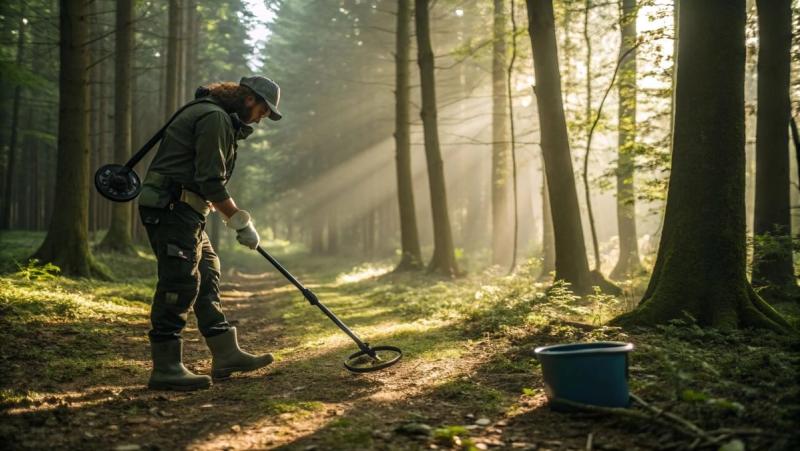
There is growing anticipation with every sweep of the coil on the earth and a connection to the nameless stories lying just inches below. Then comes a shrill, clear beep that breaks the serenity. Hurrying now with a quickened heartbeat, could that be an old rusty nail, a discarded bottle cap, or something truly worthwhile? This is the magic of metal detecting – an outdoor pastime set against the timeless excitement of a treasure search. The thought, however, remains: does this actually pay in the end, or even become a profitable venture? Let's dig in and get to the bottom of this.
The Treasure Is Everything
Before dollars and cents come into the picture, we must accentuate that most people engage in metal detecting for the sheer joy of discovery. Getting a coin from the 18th century or a colonial button probably gives one a feeling of shaking hands with history. Each find sort of acts as a physical shard of the past that tells some story of the people who just walked on that same piece of ground centuries ago.
This tug at history, mixed with the calm and exhilaration of the outdoors, is reward enough. Profitability might be the goal, but the real treasure is the experience itself: on the way down memory lane.
From Hobby to Payday: What Are You Looking For?
What does one actually look for that will make your detector sing and your wallet heavy? Modern pocket change will amount over time, but genuinely valuable finds are older and significant. The wise detectorist looks around for signals of treasure, or signals that may indicate objects made of metals with greater conductivity like silver, brass, and copper.
Here are some of the items that can be profitable:
- Silver Coins: Coins struck in the United States before 1965 are highly sought after because they consist of 90% silver. A find of these, called a "spill," is an excellent payday.
- Gold: Gold finds fetch even more money, though they are far rarer than rings and other pieces of jewellery.
- Historical Artefacts: An old military button, a belt buckle from a certain era, or an antique toy might be worth a pretty penny to a collector who cares about its history and rarity.
Understanding the Real Value of Your Finds
Under this circumstance, you discover a bunch of silver dimes and quarters. Congratulations! But what are they actually worth? The value of a precious metal find rarely remains static. A silver coin has two possible values:
- Its numismatic value to a collector.
- Its melt value is based on raw metal content.
While a rare date can make a coin exceedingly valuable to collectors, most common-date silver coins are valued based on their silver weight. That value varies daily with the global commodities market. This is why shrewd detectorists keep their eyes on the silver price chart. By keeping track of these trends, you stand a great chance of developing a sense for what your silver finds are worth at any moment and whether it will be good to sell or good to hold on to for a better offer. Understanding this market dynamic is the first step for anyone attempting to move from a basic hobbyist into the ranks of someone able to intelligently manage the value of what they find.
The Practical Side: Costs and Legality
You must spend money to make money, right? Initial purchases for metal detecting could range from a few hundred for a nice, solid entry-level detector to a few thousand for a no-expense-spared, top-of-the-line one. You will want to have a good pinpointer to zero in on targets, a sturdy digging tool, and a pouch for finds. After the gear, there are ongoing expenses: gas, batteries, and maybe occasional permits for detecting on certain public lands.
Equally important is knowing the law.
- In many instances, the law restricts detection on federal land, especially national parks and federal landmark sites.
- Private land ALWAYS requires written permission from the landowner.
Failing to abide by these rules could lead to serious monetary fines as well as the confiscation of your finds and equipment. Research everything before you set foot on those sites, and always work with ethics in mind; this way, the pastime stays fun and open to all.
Next Steps: Turning Silver into Green

The moment of finding a great treasure: maybe an exquisite coin, a golden ring, or even a great amount of silver. Divines are those moments of excitement that are followed by another equally important turn. When it comes to cashing in a major find, one should think this through carefully. You could sell to a local coin dealer, you would go consign at an auction house, or maybe you would make direct contact with a collector. Each avenue has its pros and cons when comparing speed, convenience, and top dollar you would have been able to obtain for your treasures.
A substantial find can even have certain tax implications, for which it would be better to view it as a long-term asset than immediate cash. Hence, taking professional Investment Advice in determining how best to manage your newfound asset shall be of great help. Expert advice can help you navigate your options and make a plan to address the larger financial goal at hand, be it funding your retirement or simply buying your next fine piece of outdoor gear.
Conclusion
In the end, metal detecting in the wild can prove to be a profitable business for a knowledgeable, and lucky enthusiast. While a handful of metal detectorists can make just enough of an income to supplement their earnings, very few can actually earn a living from metal detecting full-time.
Therein lies the rare treasure of metal detecting: an incredible mix of adventure, the thrill of historical discovery, and just a hint of treasure-wrangling. Profits can wax and wane with market prices and the luck of the find-hustler, but memories of a day spent out there somewhere in the wild with history, uncovering a bit of lost history, cannot be bought.
Related Posts

Your Ultimate Checklist for Baby's First Camping Trip
Planning a baby's first camping trip? This guide provides a thorough checklist to ensure a magical, safe, and comfortable experience. From choosing the perfect campsite with essential amenities to packing for safety, comfort, and nutrition, we cover all the bases. Learn how to create a cozy sleeping space under the stars, handle health and safety issues like sun and insect protection, and engage your little one with the wonders of nature. With practical advice on organization and preparation, this article helps you create cherished family memories in the great outdoors.

What Outdoor Activities Can the Whole Family Enjoy on the Sunshine Coast?
Planning a family vacation to the Sunshine Coast? This Queensland paradise offers stunning beaches, lush hinterlands, and unforgettable wildlife encounters. From building sandcastles at Kings Beach to exploring the Glass House Mountains and visiting the Australia Zoo, there's something for everyone. Discover the best outdoor activities for all ages and create lasting memories on the Sunny Coast.

10 Outdoor Materials Compared: Which Is Right for Your Project?
Planning an outdoor project in Australia? Choosing the right materials is crucial for both aesthetics and longevity. From the natural warmth of timber and the timeless elegance of stone, to the modern appeal of metal and the low-maintenance convenience of composite decking, this guide compares ten popular outdoor materials. Learn about their pros, cons, and ideal uses to make an informed decision for your backyard paradise.